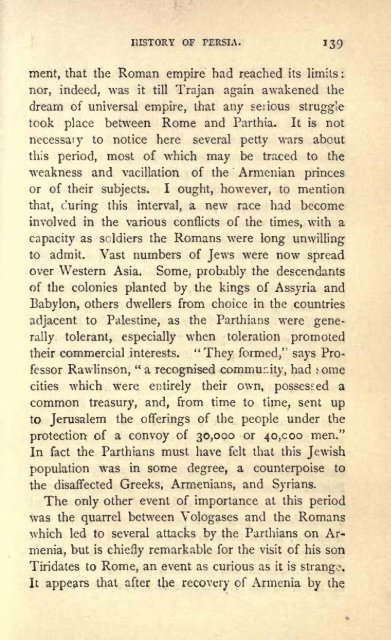Persia from the Earliest Period to the Arab
Persia from the Earliest Period to the Arab
Persia from the Earliest Period to the Arab
You also want an ePaper? Increase the reach of your titles
YUMPU automatically turns print PDFs into web optimized ePapers that Google loves.
HISTORY OF PERSIA. 139<br />
ment, that <strong>the</strong> Roman empire had reached its limits :<br />
nor, indeed, was it till Trajan again awakened <strong>the</strong><br />
dream of universal empire, that any serious struggle<br />
<strong>to</strong>ok place between Rome and Parthia. It is not<br />
necessary <strong>to</strong> notice here several petty wars about<br />
this period, most of which may be traced <strong>to</strong> <strong>the</strong><br />
weakness and vacillation of <strong>the</strong> Armenian princes<br />
or of <strong>the</strong>ir subjects. I ought, however, <strong>to</strong> mention<br />
that, curing this interval, a new race had become<br />
involved in <strong>the</strong> various conflicts of <strong>the</strong> times, with a<br />
capacity as soldiers <strong>the</strong> Romans were long unwilling<br />
<strong>to</strong> admit. Vast numbers of Jews were now spread<br />
over Western Asia. Some, probably <strong>the</strong> descendants<br />
of <strong>the</strong> colonies planted by <strong>the</strong> kings of Assyria and<br />
Babylon, o<strong>the</strong>rs dwellers <strong>from</strong> choice in <strong>the</strong> countries<br />
adjacent <strong>to</strong> Palestine, as <strong>the</strong> Parthians were gene-<br />
rally <strong>to</strong>lerant, especially when <strong>to</strong>leration promoted<br />
"<br />
<strong>the</strong>ir commercial interests. They formed," says Pro-<br />
fessor Rawlinson, " a recognised community, had i ome<br />
cities which were entirely <strong>the</strong>ir own, possessed a<br />
common treasury, and, <strong>from</strong> time <strong>to</strong> time, sent up<br />
<strong>to</strong> Jerusalem <strong>the</strong> offerings of <strong>the</strong> people under <strong>the</strong><br />
protection of a convoy of 30,000 or 40,000 men."<br />
In fact <strong>the</strong> Parthians must have felt that this Jewish<br />
population was in some degree, a counterpoise <strong>to</strong><br />
<strong>the</strong> disaffected Greeks, Armenians, and Syrians.<br />
The only o<strong>the</strong>r event of importance at this period<br />
was <strong>the</strong> quarrel between Vologases and <strong>the</strong> Romans<br />
which led <strong>to</strong> several attacks by <strong>the</strong> Parthians on Ar-<br />
menia, but is chiefly remarkable for <strong>the</strong> visit of his son<br />
Tiridates <strong>to</strong> Rome, an event as curious as it is strange.<br />
It appears that after <strong>the</strong> recovery of Armenia by <strong>the</strong>

















